Reference Letter For Nurses
[Your Name]
[Your Title/Position]
[Your Organization]
[Your Address]
[City, State, Zip Code]
[Email Address]
[Phone Number]
[Today's Date]
[Recipient's Name]
[Recipient's Title/Position]
[Hospital/Clinic Name]
[Address]
[City, State, Zip Code]
Dear [Recipient's Name],
Subject: Reference Letter for [Nurse's Full Name]
I am writing this letter to provide my enthusiastic and wholehearted recommendation for [Nurse's Full Name] for a nursing position at your esteemed hospital/clinic. I have had the privilege of working closely with [Nurse's Full Name] at [Your Organization] for [duration of working relationship] and can confidently attest to [his/her] exceptional skills, dedication, and professionalism.
Throughout [his/her] tenure at [Your Organization], [Nurse's Full Name] consistently demonstrated a remarkable ability to provide compassionate and high-quality care to patients. [He/She] has a genuine passion for nursing and is deeply committed to making a positive difference in the lives of those under [his/her] care. [Nurse's Full Name] possesses excellent clinical knowledge and is always up-to-date with the latest advancements and best practices in the field.
One of [Nurse's Full Name]'s most outstanding qualities is [his/her] ability to communicate effectively with patients, families, and colleagues. [He/She] is an empathetic listener and can quickly establish trust and rapport with patients, which greatly contributes to the overall patient experience and satisfaction. [His/Her] exceptional communication skills also extend to working collaboratively with the healthcare team, ensuring seamless coordination of patient care.
Moreover, [Nurse's Full Name] is a highly adaptable and resourceful individual. [He/She] remains calm and composed even in high-pressure situations, handling emergencies with poise and efficiency. [His/Her] ability to think critically and solve problems swiftly has been an asset to our team, and I am confident [he/she] will display the same resilience and competence in your healthcare setting.
Aside from [Nurse's Full Name]'s clinical expertise, [he/she] is an exemplary team player who is always willing to lend a helping hand to colleagues. [He/She] fosters a positive and collaborative work environment, boosting team morale and contributing to an atmosphere of trust and support.
In conclusion, I wholeheartedly recommend [Nurse's Full Name] for a nursing position at your hospital/clinic. [His/Her] passion for nursing, exceptional clinical skills, effective communication, and strong work ethic make [him/her] a valuable asset to any healthcare team. I am confident that [he/she] will continue to excel and make a positive impact on the lives of patients under [his/her] care.
If you require any further information or have any questions, please do not hesitate to contact me at [Your Email Address] or [Your Phone Number]. Thank you for considering my recommendation.
Sincerely,
[Your Name]
[Your Title/Position]
[Your Organization]
Professional Reference Letter for Nurse Seeking New Employment
Subject: Reference for [Nurse's Name]
Dear [Recipient Name],
I am writing to provide a professional reference for [Nurse's Name], who has worked under my supervision at [Hospital/Clinic Name] for [duration]. During this time, [he/she/they] demonstrated exceptional clinical skills, dedication, and a compassionate approach to patient care.
[Nurse's Name] consistently followed medical protocols and collaborated effectively with the healthcare team. [He/She/They] exhibited strong problem-solving abilities and maintained a professional demeanor under pressure.
I highly recommend [Nurse's Name] for any nursing position and am confident [he/she/they] will excel in any healthcare setting.
Sincerely,
[Your Name]
[Position]
[Hospital/Clinic Name]
Heartfelt Reference Letter for a Nurse Moving Abroad
Subject: Recommendation for [Nurse's Name]
Dear [Recipient Name],
It is my pleasure to recommend [Nurse's Name] for a nursing position in your esteemed institution. [He/She/They] has been an integral part of our team at [Hospital/Clinic Name] for [duration] and has consistently demonstrated compassion, professionalism, and dedication to patient care.
Beyond [his/her/their] clinical expertise, [Nurse's Name] is an empathetic caregiver who builds strong relationships with patients and colleagues alike. I am confident that [he/she/they] will bring the same dedication and warmth to your organization.
Please feel free to contact me if you require further details regarding [his/her/their] performance.
Warm regards,
[Your Name]
[Position]
[Hospital/Clinic Name]
Formal Reference Letter for Nurse Specializing in Critical Care
Subject: Reference for [Nurse's Name] – Critical Care
Dear [Recipient Name],
I am pleased to provide a reference for [Nurse's Name], who served in the Intensive Care Unit at [Hospital Name] from [start date] to [end date]. [He/She/They] consistently demonstrated exceptional clinical judgment, attention to detail, and proficiency in critical care procedures.
[Nurse's Name] is highly skilled in patient monitoring, emergency interventions, and teamwork, ensuring optimal patient outcomes even under high-stress situations.
I fully endorse [Nurse's Name] for any advanced nursing role and trust [he/she/they] will be a valuable addition to your team.
Sincerely,
[Your Name]
[Position]
[Hospital Name]
Quick Reference Email for Temporary Nursing Position
Subject: Recommendation for Temporary Nursing Role
Dear [Recipient Name],
I am writing to recommend [Nurse's Name] for the temporary nursing position at your facility. [He/She/They] has experience in [department/unit] and has proven to be reliable, adaptable, and professional.
I am confident [he/she/they] will provide excellent patient care during [his/her/their] tenure.
Best regards,
[Your Name]
[Position]
[Hospital/Clinic Name]
Reference Letter Highlighting Pediatric Nursing Skills
Subject: Pediatric Nursing Reference for [Nurse's Name]
Dear [Recipient Name],
I am honored to recommend [Nurse's Name], who has worked in our Pediatric Department for [duration]. [He/She/They] has demonstrated exceptional skill in caring for children, showing patience, empathy, and clinical expertise.
[Nurse's Name] communicates effectively with both children and their families, ensuring a comforting and safe environment.
I am confident that [he/she/they] will continue to provide outstanding pediatric care wherever [he/she/they] practices.
Sincerely,
[Your Name]
[Position]
[Hospital/Clinic Name]
Informal Reference Letter for Colleague Nurse
Subject: Reference for [Nurse's Name]
Hi [Recipient Name],
I wanted to share a reference for my colleague, [Nurse's Name], who has been an amazing part of our team at [Hospital/Clinic Name]. [He/She/They] is hardworking, caring, and always willing to help fellow nurses and patients.
I strongly recommend [Nurse's Name] for any nursing role – [he/she/they] will be a great asset to your team.
Best,
[Your Name]
Official Reference Letter for Nurse Certification or Licensing
Subject: Reference for Certification – [Nurse's Name]
To Whom It May Concern,
This letter serves to certify that [Nurse's Name] has been employed at [Hospital/Clinic Name] as a registered nurse from [start date] to [end date]. During this period, [he/she/they] has exhibited exceptional competence, professionalism, and adherence to medical standards.
[Nurse's Name] is fully qualified to hold a nursing license and has met all requirements for certification in [region/country].
Sincerely,
[Your Name]
[Position]
[Hospital/Clinic Name]
What is a Reference Letter for Nurses and Why It Is Needed
- A document recommending a nurse based on professional performance, skills, and character.
- Purpose:
- Supports employment applications, promotions, or new roles.
- Validates clinical competence and professional behavior.
- Provides potential employers or certification bodies with a trusted assessment.
Who Can Write a Reference Letter for Nurses
- Supervisors or managers in healthcare settings.
- Senior colleagues or department heads.
- Academic instructors or clinical mentors for newly graduated nurses.
Whom Should the Reference Letter Be Addressed To
- Prospective employers or healthcare institutions.
- Licensing or certification boards.
- Educational institutions for advanced nursing programs.
When to Provide a Reference Letter for Nurses
- During job applications or transfers.
- For licensing or certification purposes.
- For academic applications or scholarships in nursing.
How to Write an Effective Reference Letter for Nurses
- Begin with the relationship to the nurse and duration of association.
- Highlight clinical skills, professionalism, and work ethic.
- Include specific examples of achievements or outstanding performance.
- Conclude with a strong recommendation and contact information.
- Choose tone based on recipient: formal for licensing/employment, informal for colleagues.
Requirements and Prerequisites Before Writing
- Verify nurse’s employment history, positions, and responsibilities.
- Gather examples of performance or special contributions.
- Ensure knowledge of relevant certifications or specialties.
- Obtain permission from the nurse for inclusion of personal information.
Formatting Guidelines
- Length: One page is standard; avoid unnecessary details.
- Tone: Formal for official letters, professional yet warm for employment references.
- Structure:
- Subject line or purpose.
- Salutation.
- Introduction and relationship description.
- Key competencies and achievements.
- Conclusion and strong recommendation.
- Signature and credentials.
Tricks and Tips for Writing Strong Nurse References
- Use specific examples: patient care, critical incidents, teamwork.
- Mention specialties or certifications (e.g., ICU, Pediatrics, Emergency Nursing).
- Highlight soft skills: empathy, communication, adaptability.
- Keep language clear, concise, and free of jargon.
Common Mistakes to Avoid
- Using vague or generic statements without evidence.
- Overlooking the nurse’s achievements or specialties.
- Failing to include contact information for follow-up.
- Writing in a tone inconsistent with professional standards.
Elements and Structure of a Nurse Reference Letter
- Subject: State purpose (e.g., Employment, Certification, Academic Reference).
- Salutation: Address recipient properly.
- Introduction: Relationship and duration of acquaintance.
- Professional Assessment: Skills, knowledge, and competence.
- Personal Attributes: Work ethic, teamwork, empathy.
- Achievements and Examples: Notable contributions or milestones.
- Conclusion and Recommendation: Strong endorsement.
- Contact Information: For further inquiries.
- Signature and Credentials: Official designation and affiliation.
After Sending the Letter: Follow-up
- Confirm receipt by the recipient if required.
- Be available to answer any verification queries.
- Keep a copy for records and future reference.
Pros and Cons of Providing Nurse Reference Letters
Pros:
- Supports nurse’s career growth and mobility.
- Provides credibility for licensing or certification.
- Highlights professional accomplishments.
Cons:
- Requires careful wording to avoid liability.
- Time-consuming if multiple letters are needed.
- May require updates for long-term career changes.
FAQ About Reference Letters for Nurses
Q: Can a colleague write a reference?
A: Yes, but it carries less weight than a supervisor or manager.
Q: Should it mention weaknesses?
A: Focus on strengths; weaknesses may be included only if contextually required.
Q: How long is a typical reference letter?
A: Usually one page; concise yet detailed enough to provide meaningful assessment.
Q: Is attestation required?
A: For licensing boards, official letterhead and signature may be required.
Compare and Contrast with Other Letters
- Reference vs. Recommendation Letter: Reference verifies experience and skills; recommendation may advocate for a specific role or opportunity.
- Reference vs. Testimonial: Reference is professional and formal; testimonial may be personal or informal.
- Reference vs. Employment Verification: Verification confirms employment dates; reference provides qualitative assessment of skills and character.

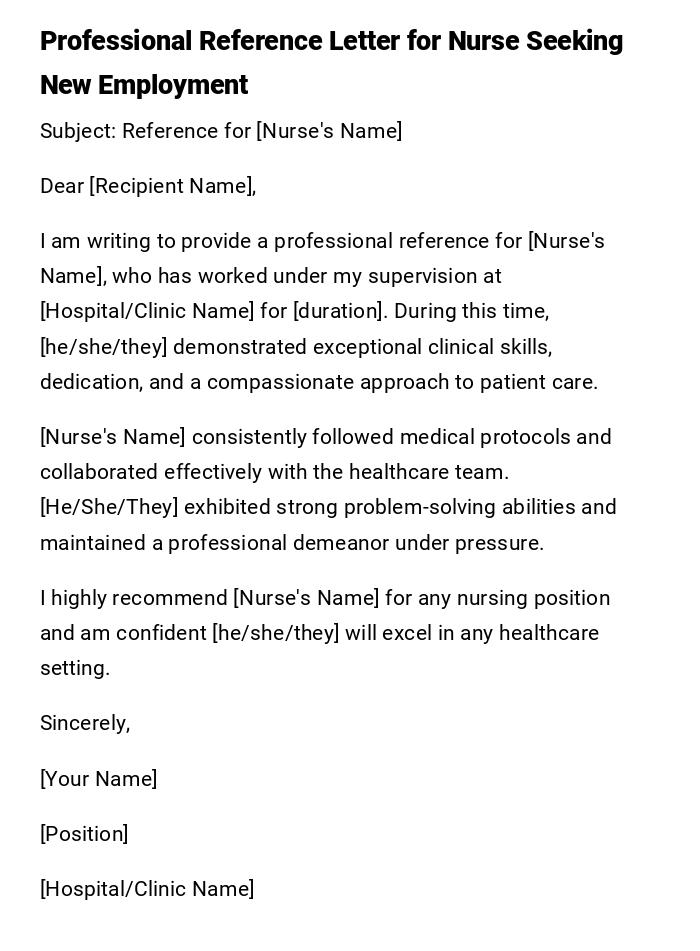
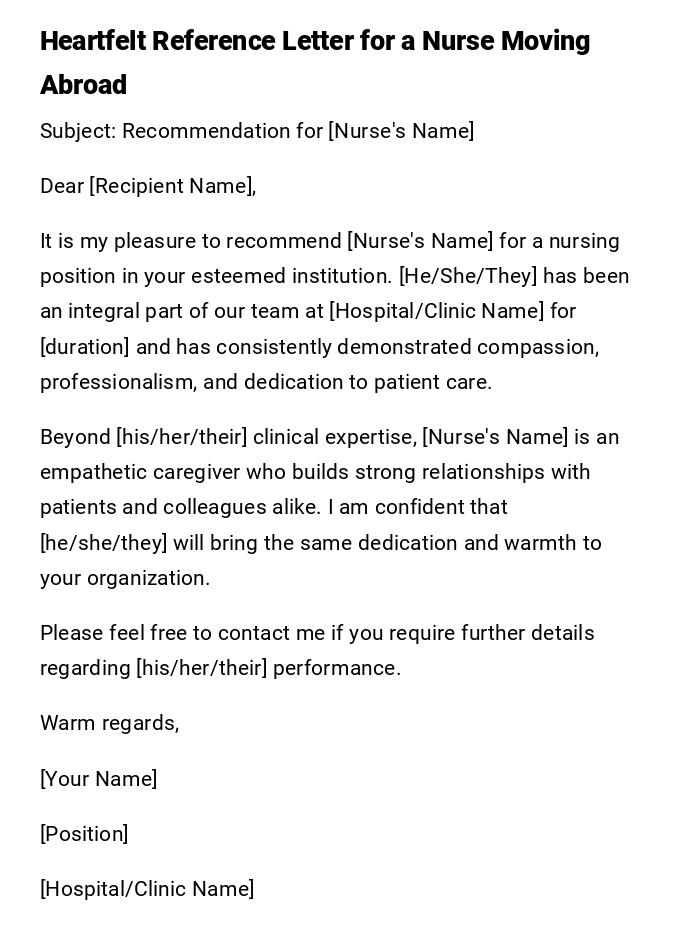
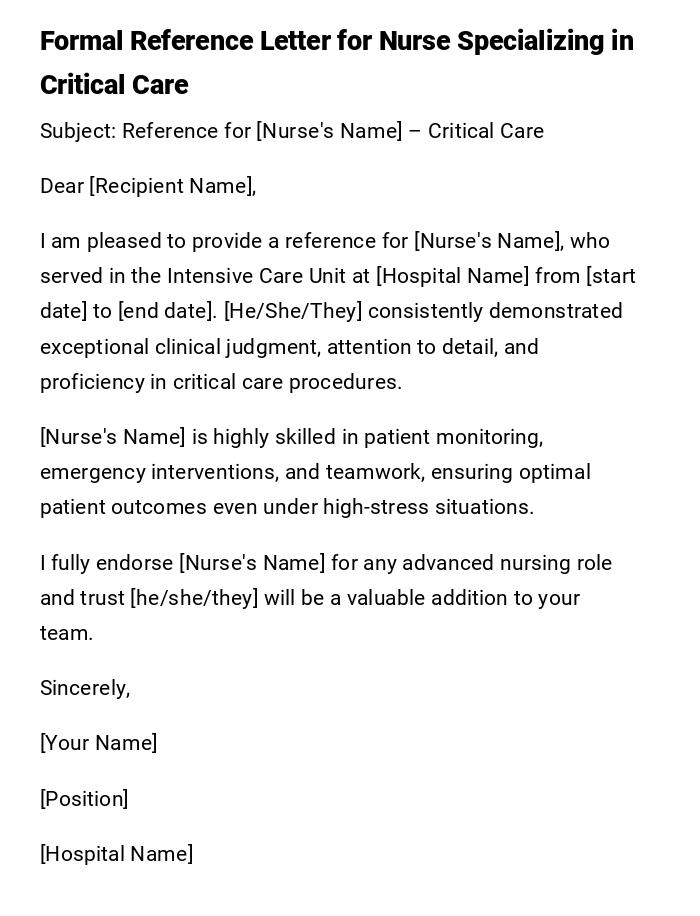
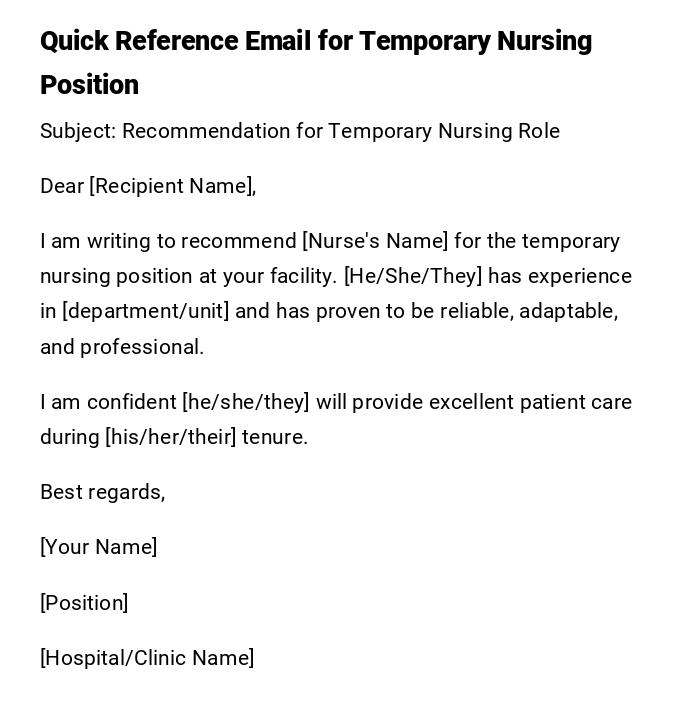
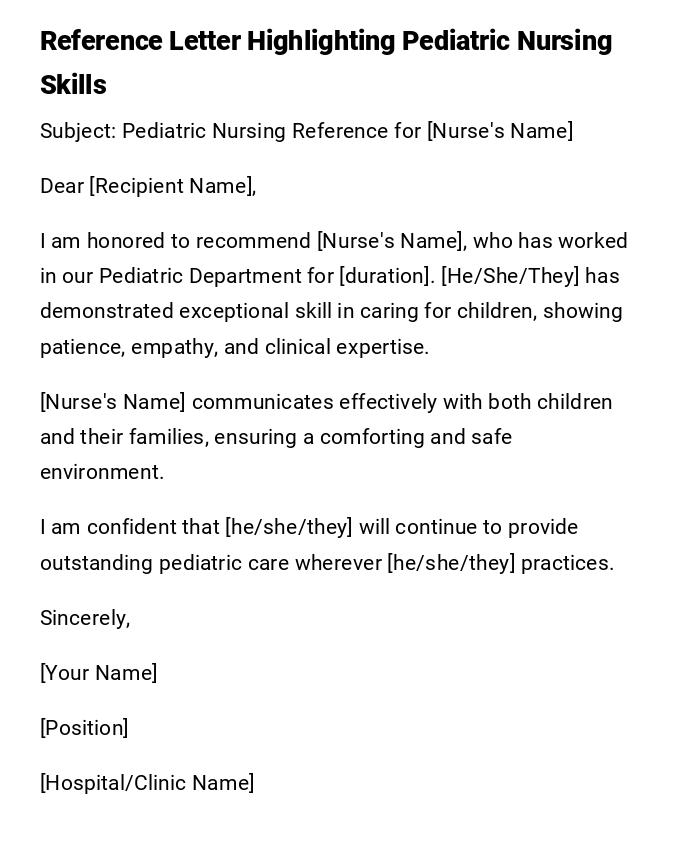
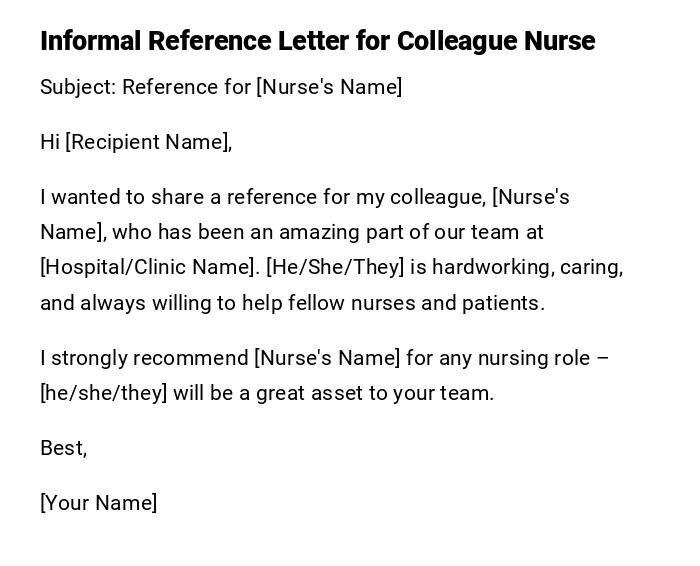
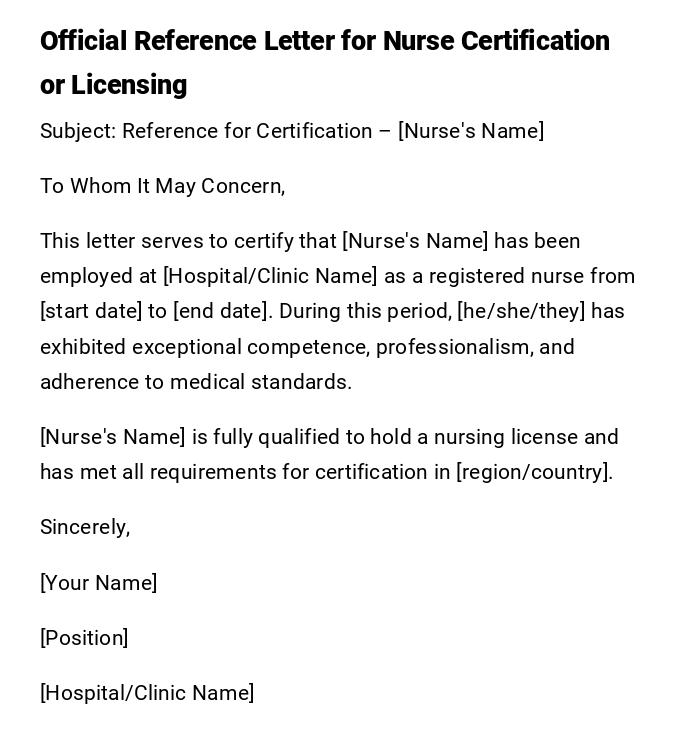

 Download Word Doc
Download Word Doc
 Download PDF
Download PDF